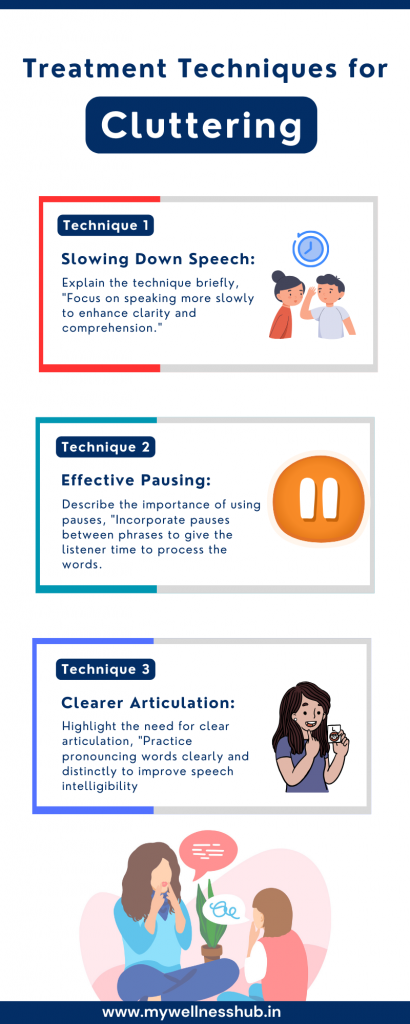Cluttering Speech Explained: Causes, Symptoms and Help
By Rajini D
Last Updated: May 7, 2024
Have you ever heard someone speak so rapidly and jumbled that it’s hard to grasp what they’re saying? This could be a sign of a lesser-known yet impactful speech disorder known as cluttering. Cluttering affects the way a person speaks, making their speech difficult to understand due to its hurried and disorganized nature. It’s different from stuttering, though the two are often confused, and understanding the distinctions is crucial.
Recognizing and understanding cluttering is more than just about correct diagnosis; it’s about enhancing communication and fostering empathy. By increasing awareness, we can improve support for those affected, making everyday interactions more accessible and less frustrating for everyone involved. This article aims to unpack the complexities of cluttering, exploring its symptoms, causes, and the treatments available, helping us step into the shoes of those who experience this condition daily.
Also Read: Understanding Cluttering Speech: What You Need to Know
What is Cluttering?
Cluttering is a fluency disorder that might not be as widely recognized as stuttering, but it significantly impacts communication. Imagine trying to listen to someone whose speech seems extremely rapid, muddled, and difficult to follow. That’s often what it’s like to hear a person who clutters. Their speech can be hurried and jam-packed with words, which they spit out in bursts, making it tough for listeners to catch the full meaning.
Also read: Understanding Speech Delay: Causes, Milestones, and Therapy
Recognizing the Symptoms of Cluttering
Identifying cluttering can be tricky, especially if you’re not sure what signs to look for. Knowing the symptoms not only aids in understanding the disorder but also in seeking timely intervention. Here’s a breakdown of the primary and secondary symptoms of cluttering, which can help in recognizing this speech disorder more clearly.
Primary Symptoms of Cluttering:
- Rapid Speech: Individuals with cluttering often speak at a pace that is much faster than usual. This rapid speech can make it difficult for listeners to keep up with what’s being said.
- Irregular Speaking Rates: You might notice abrupt changes in the speed at which a person talks; they might start a sentence slowly and suddenly speed up, or vice versa.
- Poor Articulation: Because of the fast speech rate, the clarity of speech often suffers. Words can seem to run together, making it hard to distinguish one word from another.
Secondary Symptoms of Cluttering:
- Disorganized Thought Patterns: Individuals with cluttering may jump from one idea to another without finishing the first thought, making their speech hard to follow.
- Physical Signs: Some people may show physical signs of struggling with their speech, such as facial tension or a clenched jaw, especially when trying to communicate complex ideas or when they’re aware of their rapid speech and trying to control it.
Know more about our article Understanding Language Disorders: Causes and Characteristics.
Exploring the Causes of Cluttering
Understanding the causes of cluttering is essential for developing effective treatment plans. While the exact causes of cluttering are not fully understood, research points to a combination of genetic, neurological, and developmental factors. Let’s delve into how these elements can play a role in the onset of cluttering.
Genetic Factors:
Research suggests that there might be a genetic component to cluttering. Just as certain medical conditions are passed down through families, so too can the predisposition for speech disorders like cluttering. Studies indicate that individuals with a family history of speech and language disorders may be more likely to experience cluttering. However, the specific genes involved are still under investigation, highlighting the need for further research in this area.
Neurological Factors:
Neurological factors also contribute significantly to cluttering. Differences in brain function, particularly in areas responsible for speech and language processing, can influence speech patterns. For instance, irregularities in the timing and coordination of speech motor movements can lead to the rapid and disorganized speech characteristic of cluttering. Neurological imaging studies have shown variations in brain areas like the anterior cingulate cortex and the basal ganglia among those who clutter, suggesting these areas could be involved in the development of the disorder.
Speech and Language Development:
Speech and language development play a crucial role in cluttering. Delays or abnormalities in the development of speech and language skills can manifest as cluttering. For example, difficulties in organizing and formulating language can lead to fast, spur-of-the-moment speech that makes cluttering so challenging to comprehend. Early childhood is a critical period for language acquisition, and disruptions during this phase can have lasting effects on speech fluency and organization.
Explore more: Online Speech Therapy For Stuttering
Effective Treatments for Cluttering

When it comes to managing cluttering, speech therapy stands out as the cornerstone of effective treatment. This approach not only addresses the symptoms but also aims to improve the overall communication abilities of those affected. Let’s explore some of the specific techniques used in speech therapy that have proven to be beneficial for individuals with cluttering.
Slowing Down Speech: One of the primary techniques in treating cluttering involves slowing down the rate of speech. This method helps individuals gain more control over their speech patterns, making their words clearer and easier to understand. Speech therapists often use tools and exercises like metronome pacing or reading aloud with deliberate pauses to train individuals to moderate their speech speed.
Using Pauses Effectively: Implementing strategic pauses in speech is another crucial technique. These pauses allow the speaker to take a breath, plan what they are going to say next and give the listener time to process the words. This technique can transform disorganized speech into thoughtful, coherent communication.
Practicing Clearer Articulation: Cluttering often leads to words blending together, making speech difficult to comprehend. Speech therapists work with individuals to focus on articulating each word clearly. Exercises might include repetition of tricky words, phonetic drills, or tongue twisters to improve diction and clarity.
Each treatment plan is uniquely tailored to meet the individual needs of the person with cluttering. At Wellness Hub, we pride ourselves on our personalized approach to care. Our team of speech therapists assesses each client’s specific challenges and goals to develop a customized treatment plan. This personalization ensures that every strategy directly addresses the unique aspects of each individual’s cluttering, maximizing the effectiveness of the therapy.
Effective Communication Strategies for Cluttering
| Strategy | Description | Benefits |
|---|---|---|
| Slow Speech | Practice speaking at a slower pace to improve clarity | Enhances understanding and reduces errors |
| Strategic Pausing | Integrate pauses at key points in sentences | Gives time for thought organization and aids listener comprehension |
| Clear Articulation | Focus on enunciating each word clearly | Improves speech intelligibility |
| Use of Visual Aids | Incorporate gestures or write down key points | Helps in reinforcing spoken words and ensures clear communication |
| Feedback Practice | Regularly ask for feedback from listeners | Allows for adjustments and improvement in real-time |
| Controlled Breathing | Use breathing techniques to control speech pacing | Reduces anxiety and improves speech flow |
Living with Cluttering
Living with cluttering can be challenging, but with the right strategies and support, individuals can manage their speech effectively and improve their overall quality of life. Here are some practical tips for daily management and the critical roles of support systems and self-advocacy.
Daily Management Strategies:
- Practice Mindful Speaking: Take the time each day to practice speaking slowly and deliberately. Use short sentences and pause frequently to gather your thoughts. This can help make communication clearer and less stressful.
- Set Communication Goals: Whether it’s improving the clarity of speech or increasing the length of interactions, setting small, achievable goals can provide a sense of progress and accomplishment.
- Use Technology Aids: Various apps and tools are designed to assist with speech pacing and fluency. These can be excellent resources for practicing speech techniques outside of therapy sessions.
- Create a Conducive Environment: When engaging in conversation, choose quiet and relaxed settings where you feel most comfortable. Reducing background noise can help decrease the pressure to speak quickly.
How Wellness Hub Can Help
At Wellness Hub, we understand that each individual who is cluttered faces unique challenges in their communication. That’s why our approach to speech pathology is thoroughly personalized and focused on the specific needs of each client. We believe in creating treatment plans that are as unique as the individuals we serve, ensuring that each person’s journey toward clearer communication is supported by the most effective and compassionate care possible.
Expert Speech Pathology Services:
Our team of experienced speech-language pathologists specializes in diagnosing and treating speech disorders like cluttering. With a deep understanding of the nuances associated with different speech patterns, our professionals are equipped to offer targeted strategies that can significantly improve speech fluency and organization.
Personalized Treatment Plans:
We recognize that no two cases of cluttering are exactly the same. That’s why our speech therapists work closely with each client to develop customized treatment plans that address specific needs and goals. Whether it’s through one-on-one therapy sessions, group workshops, or at-home exercises, we tailor our services to fit the individual circumstances of our clients.
Support Beyond Therapy:
At Wellness Hub, our commitment to our clients extends beyond the therapy sessions. We provide ongoing support and resources to help individuals and their families understand cluttering better and manage its impacts more effectively in everyday life. Our goal is to empower our clients, giving them the tools and confidence to communicate more freely and effectively, no matter the setting.
Conclusion
Cluttering is a speech disorder that speeds up and jumbles speech, making conversations difficult for both the speaker and the listener. It’s important to recognize the signs of cluttering, like fast and uneven speech or words that seem slurred together. Knowing these signs can lead to early help and more effective treatment. Understanding the causes, which might include genetics or differences in brain function, also helps in creating targeted therapies.
If cluttering is affecting you or someone you know, remember that you’re not alone. Treatments such as speech therapy can greatly improve how well someone can communicate, and each treatment plan is specially made to fit the individual’s needs. At Wellness Hub, we are ready to support you with personalized care and expert advice. Visit our Speech Therapy Services page for more information or to set up a consultation. We’re here to help you or your loved one speak more clearly and confidently.
Frequently Asked Questions:
1. What is cluttering in speech?
Cluttering is a fluency disorder where individuals speak rapidly and in a disorganized way, making it hard for others to understand them. This condition is characterized by a high rate of speech, irregular speech patterns, and poor articulation.
2. How do you identify if someone is cluttering and not just speaking fast?
To differentiate cluttering from simply speaking fast, look for signs like excessively rapid and jerky speech patterns, poor sentence structure, and frequent misuse of words. Those who are cluttered often exhibit disorganized thought patterns that are reflected in their speech.
3. What causes cluttering?
While the exact causes of cluttering are not fully understood, it is believed to involve a combination of genetic factors, neurological differences, and developmental issues in speech and language skills.
4. Are there effective treatments for cluttering?
Yes, cluttering can be effectively managed with speech therapy. Techniques used include slowing down the speech rate, using pauses effectively, and practicing clear articulation. Each treatment plan is tailored to the individual’s specific needs.
5. Can children outgrow cluttering on their own, or is treatment necessary?
While some children may see improvements as they develop, treatment is often necessary to manage cluttering effectively. Early intervention can provide strategies to improve speech fluency and organizational skills, which are crucial for long-term improvement.
6. What role do support systems play in managing cluttering?
Support systems are crucial for those dealing with cluttering. Family, friends, and speech therapists can provide emotional support, practice conversations, and help implement communication strategies that make daily interactions easier.
7. How does cluttering differ from stuttering?
Cluttering primarily involves rapid, disorganized speech that may be hard to interrupt, whereas stuttering is characterized by frequent stops and repetitions in speech. Cluttering’s flow is excessively fast and chaotic, unlike the blocking and hesitations seen in stuttering.
8. Is online speech therapy effective for cluttering?
Online speech therapy can be very effective for cluttering, especially if it provides flexibility and access to qualified therapists who specialize in fluency disorders. The effectiveness will depend on the individual’s specific condition and the quality of the online therapy program.
9. How can I help someone with cluttering improve their speech?
Encourage practice of slow and deliberate speech, remind them to pause frequently, and create a patient and supportive communication environment. Additionally, consulting a professional speech therapist for personalized guidance is recommended.
10. Where can I find more resources about cluttering?
For more information on cluttering, including detailed articles and treatment options, visit Wellness Hub’s Speech Therapy Services. This resource offers expert advice and support tailored to managing speech disorders like cluttering.
About the Author:
Rajini Darugupally
M.Sc., Speech-Language Pathologist (9+ years of experience)
Rajini is a passionate and dedicated Speech-Language Pathologist with over 9+ years of experience, specializing in both developmental speech and language disorders in children and rehabilitation in adults. Driven by a desire to empower each individual to find their voice, Rajini brings a wealth of experience and a warm, genuine approach to therapy.
Currently, at Wellness Hub, she thrives in a team environment that values innovation, compassion, and achieving results for their clients.
Connect with Rajini to learn more about how she can help you or your loved one find their voice.
Book your Free Consultation Today
Parent/Caregiver Info:
Client’s Details:
* Error Message









